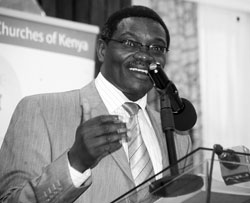By Peter Opiyo and James Ratemo
The National Council of Churches of Kenya has opposed the hybrid system of government proposed in the Harmonised Draft Constitution.
Instead it proposes Parliament amends the Constitution of Kenya (Review) Act to mandate the Committee of Experts to present two drafts — one on pure presidential system and the other on pure parliamentary system — at the referendum.
The council argues the hybrid system as proposed in the Harmonised Draft Constitution is not acceptable, noting "Kenya has experimented with it in the past with disastrous results".
NCCK General-Secretary Canon Peter Karanja said: "We challenge the Committee of Experts to be bold and present to Kenyans a pure system that is workable. The proposed system (hybrid) appears more to serve political expediency than giving our nation a fresh start."
Miss chance
By coming up with the two documents, the council claimed Kenyans would not miss the opportunity getting a new constitution.
 |
NCCK Secretary General Canon Peter Karanja at the Jumuia Conference in Limuru, yesterday. [PHOTO: ANNE KAMONI/STANDARD] |
On parliamentary system, the council proposes political parties present lists of preferred members to the National Assembly and the party leader who would be their candidate for the Prime Minister’s post to the electoral commission, six months before the election.
It said this would have constituencies scrapped and seats in Parliament allocated according to the votes the political parties attain in elections and Cabinet Ministers appointed within Parliament.
Should there be a ceremonial president under this system, he or she should be elected by Parliament.
In its proposals to be presented to the CoE, NCCK proposes the document on a presidential have a president elected by the people and must attain 50 per cent plus one vote, and 25 per cent in majority of the devolved units. Under the presidential system NCCK prefers a formula where the president, running mate and the entire Cabinet come from outside Parliament.
"If there is need for a PM, he or she would be appointed by the President and approved by Parliament and would not have executive powers," said the Reverend Karanja, in a statement jointly signed by NCCK Chairman Charles Kibicho.
NCCK also maintains retention of Kadhis Courts is contentious and it should be expunged from the draft, arguing, "It contradicts the principle of separation of State and religion."
It accused CoE of dishonesty, saying no agreement was reached between the reference group and CoE on the Kadhis court at a meeting in Nanyuki. Karanja said proposals were floated but no agreement was reached. But CoE Director Ekuru Aukot said it was agreed Kadhis court won’t be an obstacle.
Emerge contentious
"If you look at the four drafts, Section 66 of the Constitution, the Ghai, Bomas and Wako drafts, they are all clear on Kadhis court, and since the work of CoE is to harmonise the existing drafts, Kadhis court did not emerge contentious.
Dr Aukot said even in the memos the CoE received, Kadhis courts were not identified as contentious,.
NCCK also wants Parliament to amend the Constitution of Kenya (Review) Act to extend the public debate period from 30 to 60 days.
Meanwhile, CoE intends to distribute four million copies of the harmonised draft constitution.
Yesterday, CoE members distributed 30,000 copies of the draft in Wajir, Mandera and Moyale and plans to distribute 246 000 more copies to other parts of North Eastern Province.
 The Standard Group Plc is a multi-media organization with investments in media
platforms spanning newspaper print operations, television, radio broadcasting,
digital and online services. The Standard Group is recognized as a leading
multi-media house in Kenya with a key influence in matters of national and
international interest.
The Standard Group Plc is a multi-media organization with investments in media
platforms spanning newspaper print operations, television, radio broadcasting,
digital and online services. The Standard Group is recognized as a leading
multi-media house in Kenya with a key influence in matters of national and
international interest.
 The Standard Group Plc is a multi-media organization with investments in media
platforms spanning newspaper print operations, television, radio broadcasting,
digital and online services. The Standard Group is recognized as a leading
multi-media house in Kenya with a key influence in matters of national and
international interest.
The Standard Group Plc is a multi-media organization with investments in media
platforms spanning newspaper print operations, television, radio broadcasting,
digital and online services. The Standard Group is recognized as a leading
multi-media house in Kenya with a key influence in matters of national and
international interest.










